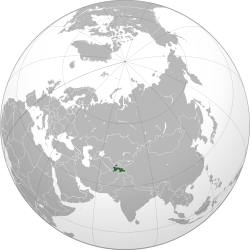Tajikistan: Uneasy Truce Holds In Southeast
By IWPR
By Lola Olimova
The Tajik authorities have extended a ceasefire agreement with rebels in the southeastern province of Badakhshan until midday on July 27. An initial deadline for the rebels to lay down their arms and hand over the suspected killers of a senior military figure came and went on July 26.
Fierce fighting took place in Badakhshan’s main town Khorog after the government sent in troops to deal with an armed group loyal to Talib Ayombekov, an officer in the Tajik border guards, who the authorities suspect is linked to the July 21 murder of Major-General Abdullo Nazarov, the local security service chief.

Although government forces deployed armoured vehicles and helicopters, they failed to crush their opponents swiftly, and instead a truce was negotiated on July 25, a day after the worst clashes.
Now the rebels have put forward their own demands, for snipers and other troops to pull back from various locations in Khorog and the surrounding hills.
The situation is calm, and gunfire is no longer heard in center Khorog. There are reports that telephone communications have been partially restored after Badakshan was cut off from the rest of the country. The authorities have urged city residents to dismantle barricades set up at entry points to some Khorog neighbourhoods, according to a correspondent for the Asia-Plus news agency on the ground.
The official death toll remains unchanged at 42 – 12 members of the security forces and 30 of Ayombekov’s men, though some unconfirmed reports suggest the figure is higher and also includes some civilians.
Although Ayombekov was formally an officer tasked with defending the border with Afghanistan, the government now accuses him and his group of having run a crime operation to smuggle drugs and other items. (See Unprecedented Clashes in Southeast Tajikistan for more context.)
It says it has captured 40 of them, including eight nationals of close neighbour Afghanistan. Some analysts point out that the Afghans may be from villages just over the river Panj, inhabited by the same ethnic Pamiris, and therefore downplay the likelihood of a Taleban connection.
President Imomali Rahmon cancelled his trip to the Olympic Games in London, and instead called an emergency meeting yesterday on July 25 during which he urged Badakhshan’s people and their political leaders to work towards stability and put a stop to the activities of “criminal groups and individuals”.
According to media reports, Rahmon spoke to Afghan president Hamid Karzai and asked him to tighten controls on his side of the border, in the Afghan province also called Badakhshan.
IWPR spoke to Ulugbek Babakulov, a journalist with the Kyrgyzstan newspaper MK-Azia, who had just crossed the border from Afghanistan into Tajikistan’s Ishkashim district, some 60 kilometres from Khorog. He confirmed that border controls had got stricter, with many Afghan soldiers checking people’s IDs.
He met only two cars coming from Tajikistan towards Afghanistan, whereas there were a few going the other way, including six Polish tourists.
The Tajik government is under mounting pressure to seek some kind of peaceful resolution and safeguard local civilians.
Tajiks abroad held demonstrations to protest against the military’s actions in cities including in Washington, Moscow and the Kyrgyz capital Bishkek. The OSCE and the United States embassy in Dushanbe expressed concern about the risk of civilian casualties.
Badakshan’s provincial governor Qadir Qasim was quoted as saying it was a mistake to bring government troops in, and promising to resign once the situation became more stable.
Lola Olimova is IWPR Tajikistan editor. This article was published at IWPR’s RCA Issue 680.
